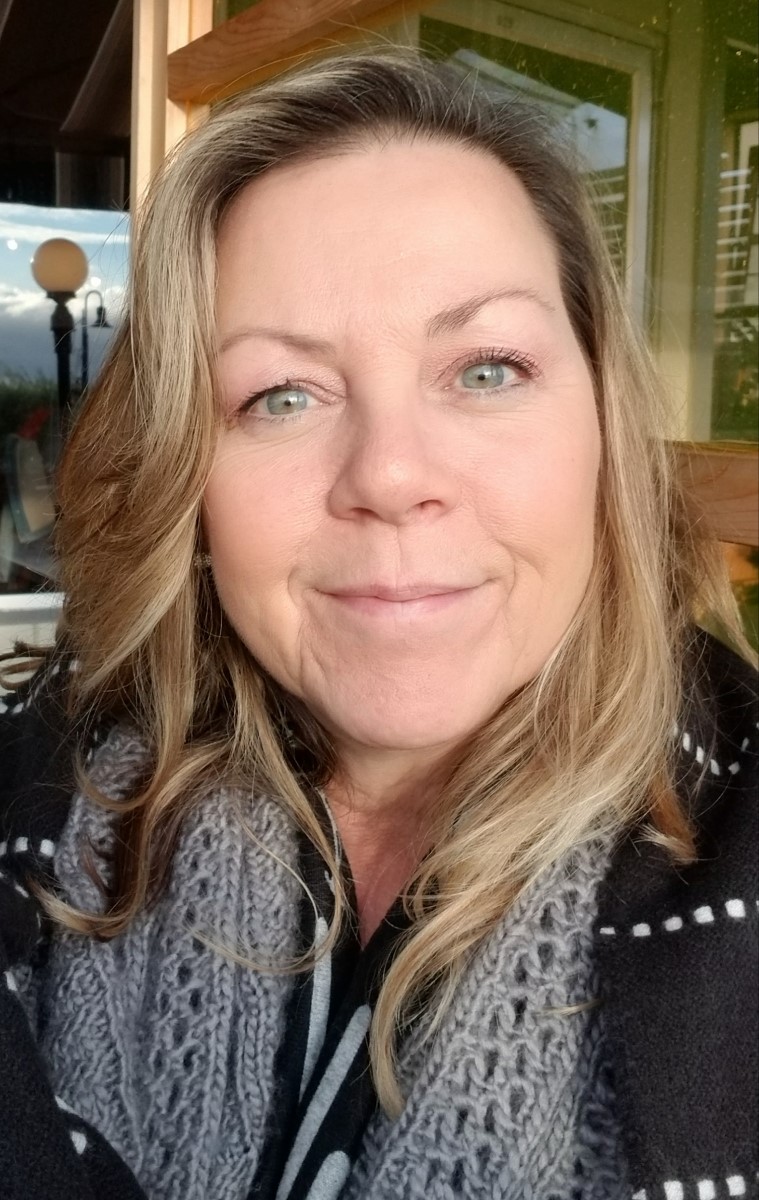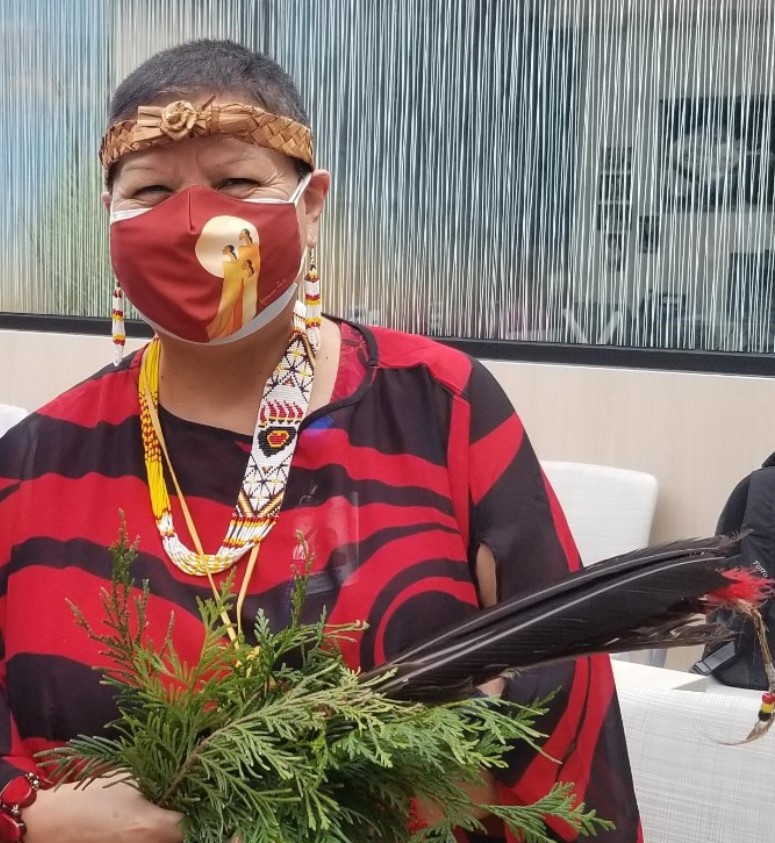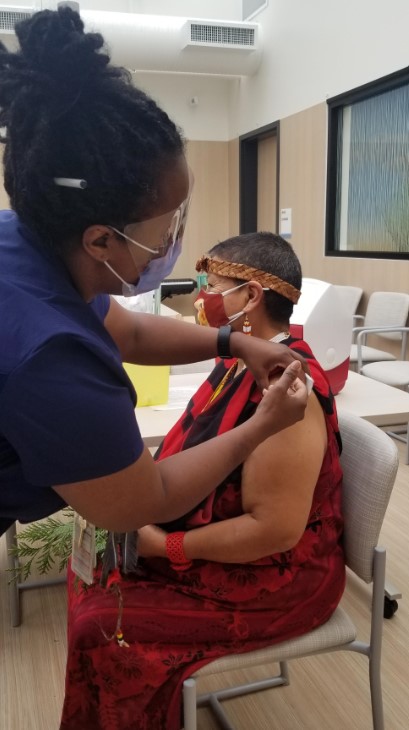Registered Nurse Cathy Zarchynski had already gone home for the day when she received the call, saying she had to plan a COVID-19 vaccine clinic the next day for families in FIR at BC Women’s.
The clinic was organized Jan. 29 for patients and their partners/support people as part of Vancouver Coastal Health’s vaccination of the Downtown Eastside population. This is consistent with vaccination prioritization in B.C., as outlined on the BC Centre for Disease Control website.
As the patient care coordinator, Cathy was on the phone planning for the rest of the evening and arrived early the next day to make sure the clinic ran smoothly.
 “Vaccinating women at FIR is important because, often, they’re people who face multiple barriers to accessing health care and can live in communities where COVID-19 outbreaks are happening,” says Cathy. “They sometimes don’t have access to PPE (personal protective equipment) and are often more susceptible to illness.”
“Vaccinating women at FIR is important because, often, they’re people who face multiple barriers to accessing health care and can live in communities where COVID-19 outbreaks are happening,” says Cathy. “They sometimes don’t have access to PPE (personal protective equipment) and are often more susceptible to illness.”
FIR is a combined care unit that provides health care to pregnant women and new mothers who use substances and their infants, who may have been exposed to these substances. Health-care workers help women and their newborns stabilize, keeping mothers and babies together whenever possible. Care is provided before and after birth and women are helped in their transition back to their community. FIR also provides access to counselling, life-skills training, recovery-oriented programming and teaching in parenting techniques.
The morning of the clinic, Cathy went room-to-room to inform everyone that vaccines were on the way.
“That afternoon, we formed a circle, with all the COVID-19 principles and precautions, and people just started to come. Everyone joined in, even the ones who weren’t sure,” she says.
 Indigenous Elder Roberta Price opened the clinic, talking about the history of health care, particularly immunizations, and how they’ve had negative impacts on Indigenous people. About 70 per cent of women cared for in FIR are Indigenous. Many women who come to FIR come from a life of poverty, historical and ongoing trauma, and lack of appropriate, stable housing.
Indigenous Elder Roberta Price opened the clinic, talking about the history of health care, particularly immunizations, and how they’ve had negative impacts on Indigenous people. About 70 per cent of women cared for in FIR are Indigenous. Many women who come to FIR come from a life of poverty, historical and ongoing trauma, and lack of appropriate, stable housing.
“You could feel the emotion in the room when Elder Roberta was speaking,” Cathy says. “It was really, really moving. Then she turned the conversation to, ‘It’s time for change and it’s time to believe in the medicine being provided.’”
It’s crucial to recognize the health-care related trauma many of the women at FIR or their family members have gone through, says Denise Bradshaw, director of Provincial Health Initiatives at BC Women’s.
 “That’s part of the distrust we’re trying to prevent and address,” says Denise. “For different reasons, there’s trauma in the lives of the women we serve. It’s significant. The trauma is related to colonization, racism, intergenerational trauma associated with childhood and some of it is cumulative trauma.
“That’s part of the distrust we’re trying to prevent and address,” says Denise. “For different reasons, there’s trauma in the lives of the women we serve. It’s significant. The trauma is related to colonization, racism, intergenerational trauma associated with childhood and some of it is cumulative trauma.
"We needed to approach the vaccination clinic through an anti-racism lens and do what we could in a short period of time to protect Indigenous people and others from the potentially harmful effects of the virus.”
Elder Roberta told those at the vaccination clinic that she had been getting vaccinated for years and that she believes in the COVID-19 vaccine. She volunteered to be the first one to be vaccinated for COVID-19 at FIR.
“As Elder and Matriarch, it is very important that we role-model important steps in staying healthy, for ourselves, for our family, our children, our grandchildren and our great grandchildren,” says Elder Roberta. “In role-modelling for vaccines, we may also encourage other community members to take this very important step.”
The public health nurses were invited into the circle. Dr. Charissa Patricelli, medical director of FIR, was also in the circle to answer any questions.
 “Initially, we were going to give the vaccines in private, in the procedure room, but Elder Roberta wanted people to witness her getting vaccinated,” says Cathy. “When she got the vaccine, she said ‘Oh, I didn’t even feel that.’ From there, people lined up, saying ‘I want to go next’ and there was no need to move to the procedure room.”
“Initially, we were going to give the vaccines in private, in the procedure room, but Elder Roberta wanted people to witness her getting vaccinated,” says Cathy. “When she got the vaccine, she said ‘Oh, I didn’t even feel that.’ From there, people lined up, saying ‘I want to go next’ and there was no need to move to the procedure room.”
Everybody took their turn and there were a few people who chose not to take the vaccine.
“The mood was very relaxed,” says Cathy. “Babies were there, partners were there. Elder Roberta has a way of putting people at ease. I was expecting people to be squeamish about needles or vaccines, but there was none of that. Everybody just waited and had conversations, physically distanced, of course. Some people went outside to the garden to wait and came back in.”
Twelve people in total were vaccinated that day and more than 1,700 people have now been vaccinated at BC Women’s and BC Children’s Hospital.
“I feel very privileged to have received the vaccine and it’s too bad not everyone has received it,” says a woman who is a patient at FIR and preferred to remain anonymous. “I feel very safe.”
Cathy says the more BC Women’s provides health care to women at FIR, the better their outcomes are going to be. Vaccinating them for COVID-19 is one more way to improve their health.
“I’m honoured, humbled and proud to have been able to facilitate this,” says Cathy. “It’s an amazing opportunity for these women and their families.”
